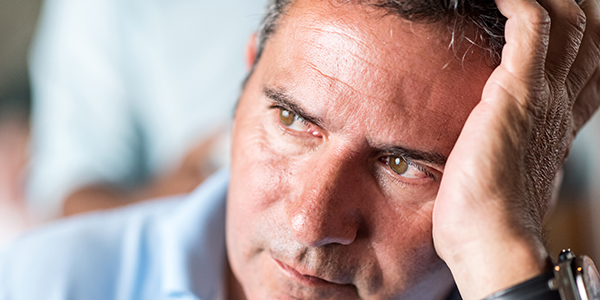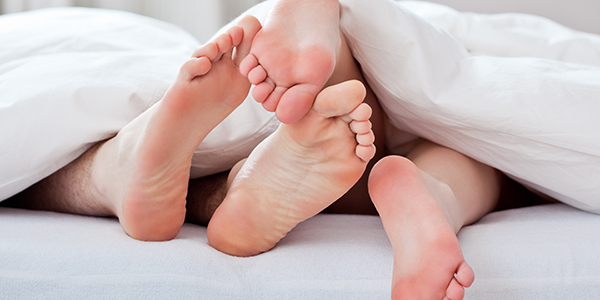Interstitial cystitis (IC), or painful bladder syndrome (PBS), affects more than just your body. Understanding how it affects your thoughts, feelings, and behaviours will help you to protect and manage your mental health.
The video above will show you some of the basics about how IC/PBS can affect mental health and what you can do for your well-being.

How can IC/PBS affect my quality of life and mental health?
The symptoms of IC/PBS can affect simple day-to-day activities. If you don't manage them properly, these symptoms can have a negative effect on your quality of life. Quality of life means your well-being. It’s a blend of your physical and mental health.
IC/PBS can affect your:
- sleep
- emotional well-being
- relationships and social life
- day-to-day activities
- energy and how much you can do
- sexual activity
What are some unhelpful responses to IC/PBS?
When dealing with IC/PBS, a good place to start is by noticing the ways you think and react to it. Some ways aren’t helpful and can lower your quality of life. Here are 3 common responses that aren’t helpful:
-
Pain catastrophizing is when you think about your condition a lot and expect the worst. It can make you feel hopeless.
-
Negative emotional response is when you have strong feelings of depression, anxiety, or anger about your condition and these feelings won’t go away.
-
Illness-focused coping is when you rely too much on rest and avoid your daily activities to cope with IC/PBS symptoms.
What are some helpful responses to IC/PBS?
There are things you can do to feel better about yourself and how you’re dealing with IC/PBS:
- Learn everything you can about your condition.
- Do what you can to manage your IC/PBS (for example, change your diet, do your physiotherapy exercises, ask for help when you need it).
- Follow your healthcare provider’s advice and take your prescription medicines as prescribed.
- Build confidence and be proud of things you're doing well.
- Stay active and involved in your life.
- Make changes to your life if you need to.

How can cognitive behavioural treatment and mindfulness meditation help?
Cognitive-behavioural therapy (CBT) is a treatment that works well for improving chronic (long-term) pain. CBT teaches specific skills to change how you think, feel, and act when dealing with IC/PBS.
Research shows that CBT, and doing your best to manage IC/PBS yourself, can help with pain, anxiety, and depression, and make your quality of life better.
These are some of the key skills CBT teaches:
-
Self-monitor: Keeping a diary or journal helps you be more aware of your pain levels, urinary symptoms, triggers, and patterns. Watch for triggers that make the symptoms worse. Look for what helps your mind and body feel better.
-
Pacing: This helps you to take part in activities that are important to you while managing your pain and symptoms. Stay active and socialize with family and friends. Pace your activities by taking breaks or changing positions to avoid a flare-up.
-
Practice relaxation: Relaxation techniques, such as deep breathing or imagery (picturing something in your mind), can ease the pain and stress that can give you tense muscles and make pain worse.
-
Positive self-talk: This helps you manage negative thoughts, feelings, and behaviours that can go along with pain and other symptoms. Focus your thoughts on things you enjoy and are doing well rather than on your health condition.
-
Assertive communication: This helps you to be clear and confident when you talk with family, friends, and healthcare providers about your pain and what you need to cope with your health condition.
-
Flare-up plan: Make a plan ahead of time, so you’ll know what to do when a flare-up happens.
Mindfulness meditation is a different set of skills that can help you manage how you react to IC/PBS. Mindfulness meditation involves paying attention to your thoughts, feelings, and sensations in the present moment without judging or trying to change anything. With practice, mindfulness can help you feel calmer and react less strongly to stress. It has been shown to help people cope with many chronic health conditions, including many forms of chronic pain.
If you don’t manage your IC/PBS symptoms, you might be at risk of becoming depressed. If you need help, see your family doctor, a psychologist, or mental health counsellor and ask about CBT.

How can IC/PBS affect my sex life?
People with IC/PBS may be very concerned about how it can affect sex and their relationships.
People diagnosed with IC/PBS often fall into 2 unhelpful patterns when they’re trying to deal with pain during sex: they either push through sex or avoid sex.
A healthier way to approach sex with IC/PBS is by taking a pain management approach.
Pain management approach
You can learn to enjoy sex without making the pain worse or having a flare-up. You and your partner can do many things to help with IC/PBS pain when you have sex. These tips can help you have healthy intimacy with your partner while managing IC/PBS pain.
-
Plan: Plan sex for a time when your pain is usually better.
-
Prepare: To help relax your body and mind, and to better enjoy sex, try sensual touch or massage by having a warm shower or bath together.
-
Communicate: Tell your partner what you like and what’s helpful to you to manage your symptoms and pain.
-
Explore other kinds of sexual activity: If intercourse is painful, try other sensual activities that you both like (such as oral sex, pleasurable touch).
-
Be intimate in other ways: Remember that intimacy can come from shared closeness, touch, talking, and other activities you enjoy.
-
Try different things: By exploring different positions or activities, you and your partner will figure out what works best for you to manage the pain and symptoms.
-
Change the goal: Remember that sexual intimacy is about sharing and closeness, and not about reaching a goal (that is, it's about more than intercourse).
-
Care for yourself after sex: Do some light stretching or take a warm bath.
You can also:
- Talk to a doctor or pharmacist about medicine that won’t affect your sexual function.
- Ask a doctor or physiotherapist about positions that won’t cause pain.
- Find a counsellor who specializes in chronic pain and couples’ counselling, and possibly sex therapy.

Ongoing management of IC/PBS
Self-management is your best tool for dealing with IC/PBS. It means learning the skills you need to manage IC/PBS yourself and then using them in your day-to-day life. Self-management means:
- learning about IC/PBS and chronic pain
- taking an active role in making decisions about your treatment
- following through with treatments and doing the recommended exercises
- learning coping skills like
cognitive behavioural therapy skills and mindfulness meditation
